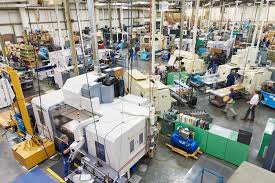 There are plenty of reasons manufacturers need to transform themselves with Industry 4.0, a wide-ranging set of digital technologies aimed at making the manufacturing process nimbler, more efficient and productive — and more profitable. But today, the most important reason may well be the uncertain trade climate and rising tariffs, which affect manufacturing more than any other industry.
There are plenty of reasons manufacturers need to transform themselves with Industry 4.0, a wide-ranging set of digital technologies aimed at making the manufacturing process nimbler, more efficient and productive — and more profitable. But today, the most important reason may well be the uncertain trade climate and rising tariffs, which affect manufacturing more than any other industry.
 So concludes a study from Deloitte, Deloitte’s 2020 Manufacturing Industry Outlook. One of 2020’s big manufacturing trends, the study says, is that the uncertainly about the effects of the ongoing trade wars between the United States and much of the rest of the world “is driving manufacturing companies to build digital muscle.”
So concludes a study from Deloitte, Deloitte’s 2020 Manufacturing Industry Outlook. One of 2020’s big manufacturing trends, the study says, is that the uncertainly about the effects of the ongoing trade wars between the United States and much of the rest of the world “is driving manufacturing companies to build digital muscle.”
The report notes that many manufacturers have been pleased with their progress towards Industry 4.0 and want to invest more in it. However, the report warns, “the current labor and trade uncertainties within the global manufacturing industry could stall digital progress.” As a result of that, it says, “Many companies have shifted their efforts toward digital projects that build agility and scalability to help them to manage risk.”
Specifically, the report says, manufacturers are being harmed by the disruption in global supply chains caused by U.S. tariff wars with other countries, particularly China. It points out, “US imports from China were down 12.7 percent in the first eight months of 2019 versus the same period in 2018. Meanwhile, US imports from Mexico were up 5.9 percent, and US imports from Vietnam were up 37.4 percent. In a matter of months, manufacturers have shifted both sourcing and production to different geographies, seeking tariff-friendly combinations. For manufacturers, this must be executed precisely given lead times (and even customer approvals) for both original equipment and their highly profitable aftermarket components.”
How can manufacturers quickly change sourcing, production and supply chains in response? The report concludes, “Digital ‘muscle building’ can be one of the leverage points to increase flexibility in global supply chains. Applying artificial intelligence, cloud computing, advanced analytics, robotics, and additive manufacturing to the value chain can increase visibility and transparency, allowing manufacturers to make faster changes to operations to respond to market-based threats or opportunities.”

Further Reading:
Adding Artificial Intelligence Capabilities to Your Mobile Apps
The Best Solutions for Building Digital Muscle and Getting to Manufacturing Industry 4.0
To build digital muscle and reach Industry 4.0, manufacturers need the right software. Alpha TransForm manufacturing solutions help manufacturers digitally transform their business. These manufacturing solutions utilize the latest mobile device features (camera, GPS, etc.) for fast, accurate data capture. The resulting apps deliver custom dashboards, can tie into any corporate system, and can power workflow processes that initiate an emergency stop, take corrective action, or trigger order replacement.
Let's look at two examples.
First, Gemba walks are used in lean manufacturing to capture important observations that can lead to continuous improvements. Gemba walks are particularly useful because they put manages right at the heart of the manufacturing process - often on the shop floor - to collect process insights and interview team members. The insights from Gemba walks can provide insights that identify problem areas and opportunities for improvement in production, inventory, work areas, and safety. Digitizing Gemba walks takes a static paper process and adds photos, audio recording of interviews, time and data stamping, bar code scanning and more. The insights can immediately be shared, measured and compared for true continuous improvement.
See a demo and get free access to the Gemba Walk solution.
Second, Non-conformance reports identify and track problems discovered during quality audits or inspections. They can include defects, parts of the product that fail to meet specifications, issues relating to vendor supplies and more. Once an issue is detected, all the facts about the issue are collected -- traditionally on a paper form -- and recommendations to resolve the issue are added. The non-conformance report can include details about measurements outside parameters, color discrepancies, shipping damage, operator handling, or other issues. If the form is digital, the non-conformance report can make use of photos, bar code scans, time and date stamping, speech-to-text notes and more. Digital non-conformance reports can also automatically trigger next steps, such as alerting a manufacturing engineer or operations manager, and even initiating a repair.
See a demo and get free access to the Non-conformance Report solution.
Other needs? Talk to us about your specific needs or view our 5S Audit Template and other manufacturing apps.







Comment